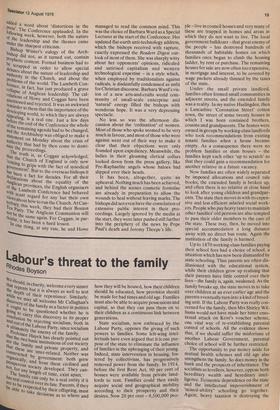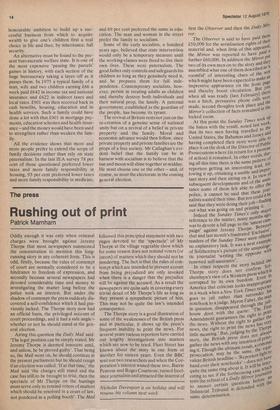Labour's threat to the family Rhodes Boyson We s hould, in
charity, welcome every sinner that repents but it is always as well to test the depth of their repentance. Similarly, While We d. iscovery may all welcome Mr Callaghan's I of the family as a factor in politics t OUght to be questioned whether he is going to early this discovery to its proper e°nclusion by rejecting socialism, both in ,nd out of the Labour Party, since socialism is ultimately the enemy of the family. ., Professor Hayek has clearly pointed out are Mat the two basic institutions of our society the family and private property, and that these are constr inter-related. Neither was ucted by government: both grew pros organically, and from them civilised and perous for any le society developed. They can not, ngth of time, exist apart. has Thens rea family can only be a real entity if it l control e to be res over its fate. Parents, if they pec 'rted by their offspring, must be able to take decisions as to where and how they will be housed, how their children should be educated, how provision should be made for bad times and old age. Families must also be able to acquire possessions and capital, so that they can pass them on to their children as a continuous link between generations.
State socialism, now embraced by the Labour Party, opposes the giving of such powers to families. Some left-wing intellectuals have even argued that it is one purpose of the state to eliminate the influence of families in the upbringing of their young. Indeed, state intervention in housing, fostered by collectivism, has progressively removed power from the family. In 1914, before the first Rent Act, 90 per cent of houses were available from private landlords to rent. Families could then easily acquire social and geographical mobility according to their prosperity and their desires. Now 20 per cent — 8,500,000 peo ple —live in council houses and very many of these are trapped in homes and areas in which they do not want to live. The local government bulldozer — that great enemy of the people — has destroyed hundreds of thousands of habitable homes on which families once began to climb the housing ladder, by rent or purchase. The remaining houses for sale are now often too expensive, in mortgage and interest, to be covered by wage packets already thinned by the taxes of the state.
Under the small private landlord, families often formed small communities in adjacent streets, and the extended family was a reality. In my native Haslingden, then a Lancashire 'Coronation Street' cotton town, the street of some twenty houses in which I was born contained brothers, cousins and grandparents. The homes were owned in groups by working-class landlords who took recommendations from existing tenant families when a house became empty. As a consequence there were no problem families or slum houses — the families kept each other 'up to scratch' so that they Could gain a recommendation for another relative in a future vacancy.
Now families are often widely separated by imposed allocations and council rule books; the extended family is broken up, and often there is no relative at close hand to look after young children and grandparents. The state then moves in with its expensive and less efficient salaried social workers. People who pay heavy taxes to maintain other families' old persons are also tempted to pass their older members to the care of the state. These may, then, be moved into special accommodation a long distance away with no direct bus route. Again the institution of the family is harmed.
Up to 1870 working-class families paying their school fees had a choice of school, a situation which has now been dismantled by state schooling. Thus parents are often disillusioned with the educational system, while their children grow up realising that their parents have little control over their lives — the family is, again, weakened. As the family breaks up, the state moves in to take over children at an ever earlier age and the parents eventually turn into a kind of breeding unit. If the Labour Party was really concerned for the family, then Mrs Shirley Williams would not have made her bitter emotional attack on Kent's voucher scheme, one vital way of re-establishing parental control of schools. All the evidence shows that, if we should suffer the misfortune of another Labour Government, parental choice of school will be further restricted.
The opportunity to put money aside for mutual health schemes and old age also strengthens the family. So does money in the bank and the prospects of inheritance. The socialists as levellers, however, oppose both hereditary wealth and hereditary intelligence. Economic dependence on the state and the intellectual impoverishment of 'mixed-ability' schooling go together. Again, heavy taxation is destroying the
honourable ambition to build up a successful business from which to acquire wealth to give one's children first a real choice in life and then, by inheritance, full security.
An alternative must be found to the present bureaucratic welfare state. It is one of the most expensive 'passing the parcels' games in history, with each section of the huge bureaucracy taking a layer off as it passes them. In 1975 a typical family of a man, wife and two children earning £66 a week paid £642 in income tax and national insurance and £622 in indirect taxes and local rates. £901 was then received back in cash benefits, housing, education and in health services. Such a family could have done a lot with that £901 in mortgage payments, education schemes and health insurance —and the money would have been used to strengthen rather than weaken the family.
All the evidence shows that more and more people prefer to extend the scope of family decisions rather than rely on state paternalism. In the last IEA survey 78 per cent of those questioned preferred lower taxes and more family responsibility in housing, 93 per cent preferred lower taxes and more family responsibility in medicine, and 69 per cent preferred the same in education. The man and woman in the street prefer the family to socialism.
Some of the early socialists, a hundred years ago, believed that state intervention would only be a temporary measure until the working-classes were freed to live their own lives. These were paternalists. The good father only controls and safeguards his children so long as they genuinely need it, and he prepares them for full independence. Contemporary socialists, however, persist in treating adults as children and thereby destroy both individuals and their natural prop, the family. A paternal government, established as the guardian of the people, has become its tyrant.
The revival of Britain rests not just on the re-creation of a genuine sense of national unity but on a revival of a belief in private property and the family. Moral and economic advance would then follow, since private property and private families are the props of a free society. Mr Callaghan's evident belief that the family can be in harness with socialism is to believe that the sun and moon will shine together at midday. He must choose one or the other — and, of course, so must the electorate in the coming general election.































 Previous page
Previous page